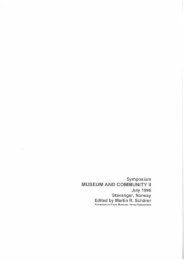Key Concepts of Museology - ICOM
Key Concepts of Museology - ICOM
Key Concepts of Museology - ICOM
Create successful ePaper yourself
Turn your PDF publications into a flip-book with our unique Google optimized e-Paper software.
I NTRODUCTION<br />
everyone shares a common language (scientifi c or not). The international<br />
committees <strong>of</strong> <strong>ICOM</strong> are well aware <strong>of</strong> this situation, which, to<br />
avoid the risk <strong>of</strong> a Babel, leads them to favour one language – English<br />
– today’s lingua franca. Naturally, the choice <strong>of</strong> the smallest common<br />
denominator works to the benefi t <strong>of</strong> those who master the language,<br />
<strong>of</strong>ten to the detriment <strong>of</strong> many others less familiar with the tongue<br />
<strong>of</strong> Shakespeare, who are forced to present their thoughts only in a<br />
caricatured version. Using one <strong>of</strong> the three <strong>ICOM</strong> languages (English,<br />
French and Spanish) was unavoidable, but which one? The nationality<br />
<strong>of</strong> the fi rst contributors, under the direction <strong>of</strong> André Desvallées<br />
(who had worked for many years with Georges Henri Rivière, the fi rst<br />
Director <strong>of</strong> <strong>ICOM</strong> and the founder <strong>of</strong> French museology) quickly led<br />
to the selection <strong>of</strong> French, but there were other arguments in its favour.<br />
Most <strong>of</strong> the contributors can read if not all three, then at least two <strong>of</strong><br />
the <strong>ICOM</strong> languages, even though their command may be far from<br />
perfect. We are familiar with the wealth <strong>of</strong> Anglo-American contributions<br />
in the museum fi eld, but we must point out that most <strong>of</strong> these<br />
authors – with some notable exceptions, such as the emblematic fi gures<br />
<strong>of</strong> Patrick Boylan and Peter Davis, read neither French nor Spanish. The<br />
choice <strong>of</strong> French in connection, we hope, with a fairly good knowledge<br />
<strong>of</strong> foreign literature, allowed us to embrace, if not all contributions<br />
in the museum fi eld then at least some <strong>of</strong> its aspects, which are not<br />
generally explored but which are very important for <strong>ICOM</strong>. We are,<br />
however, aware <strong>of</strong> the limits <strong>of</strong> our research and hope that this work<br />
will inspire other teams to present, in their own language (German or<br />
Italian, for example), a different approach to the museum fi eld.<br />
On the other hand, the choice <strong>of</strong> a language has consequences<br />
for the structuring <strong>of</strong> thought – as illustrated by a comparison <strong>of</strong> the<br />
defi nition <strong>of</strong> the museum by <strong>ICOM</strong> in 1974 and in 2007, the fi rst being<br />
originally drafted in French, the second in English. We are aware<br />
that this volume would not have been the same in Spanish, English or<br />
German, both on the level <strong>of</strong> its structure and in its choice <strong>of</strong> terms,<br />
but there would also have been a certain theoretical bias! It is not<br />
surprising that most practical guides about museums are written<br />
in English (such as the excellent manual edited by Patrick Boylan<br />
17
















